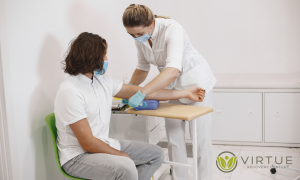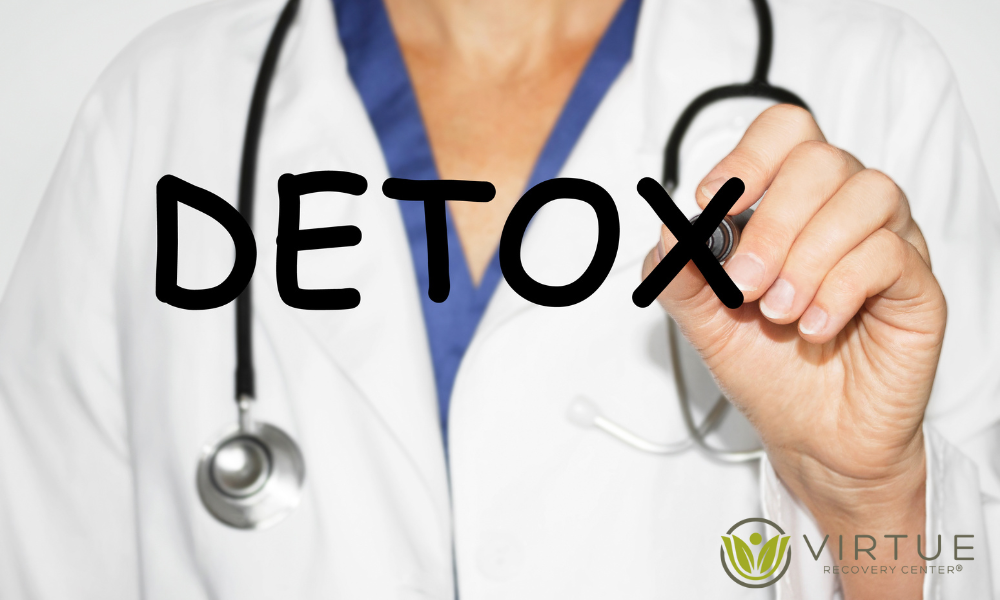Key Takeaways
- Mixing stimulants and depressants in alcoholic energy drinks can be dangerous.
- Caffeine may mask intoxication, leading to overconsumption.
- A medical detox program is often necessary for safe recovery.
- Young adults are at a higher risk of substance use disorders.
- Alcohol detox and outpatient programs support physical and mental healing.
- Early intervention improves recovery outcomes and long-term sobriety.
Introduction
Alcoholic energy drinks are becoming more and more popular in bars and colleges, but they come with a hidden risk. Caffeine and alcohol together can make you feel more awake than you are, which can lead you to go beyond what is safe for your body. This dangerous combination has been linked to poor judgment, blackouts, alcohol poisoning, and in some cases, the onset of a full-blown substance use disorder (CDC, 2024).
When dependence sets in, drinking casually can turn into a bad habit. That’s when a medical detox program becomes essential. These programs give you medically supervised help to deal with withdrawal safely and set the stage for long-term recovery.
Why Are Alcoholic Energy Drinks So Dangerous?
The fact that alcoholic energy drinks have opposite effects makes them especially dangerous. Caffeine is a drug that keeps people awake and alert. Alcohol, on the other hand, is a depressant that makes the brain and muscles work more slowly. When taken together, the stimulant hides the sedative effect of alcohol, making people think they are less drunk than they are.
This often leads to:
- Having more drinks than planned
- More likely to take risks
- More likely to get hurt or have an accident
- Higher chance of becoming dependent on alcohol
The Centers for Disease Control and Prevention (CDC) has said that these drinks are awful for young adults because data shows a link between drinking them and going to the emergency room for alcohol-related problems.
What Is a Medical Detox Program and How Can It Help?
A medical detox program is the safest place to start treatment for someone who is physically dependent on alcohol, especially if they drink a lot of high-caffeine mixed drinks. It can be dangerous to stop drinking alcohol without medical help. If you suddenly stop using drugs, you could have seizures, hallucinations, or a life-threatening condition called delirium tremens.
In a clinical detox setting, medical professionals monitor vital signs and treat symptoms with FDA-approved drugs and other forms of support. This method makes withdrawal less painful and prevents complications.
A detox setting also helps people with their emotions and connects them to the next steps in their recovery, like residential or outpatient treatment programs.

Who Is Most Likely to Get a Substance Use Disorder?
Some groups of people are more likely to become addicted to alcoholic energy drinks. These are:
- College students and young adults who drink too much or mix drugs while out with friends
- People whose family members have been addicted
- People who have mental health problems like anxiety or depression but don’t get help for them
- People who work in high-stress jobs and use drugs and alcohol to deal with tiredness or burnout
According to a study published in Alcoholism: Clinical and Experimental Research, there is a significant association between frequent energy drink consumption and increased risk of alcohol dependence (Drunkenerin et al., 2010).
What Are Some Signs That Someone Might Need an Alcohol Detox Program?
It’s important to know when casual drinking has turned into an addiction. Here are some signs that you need to go through an alcohol detox program:
- Even when alone, drinking alcoholic energy drinks a lot
- Having to drink more alcohol to get the same effects (tolerance)
- Having withdrawal symptoms like sweating, feeling sick, shaking, or being irritable
- Failing to stop or cut back, even when you try.
- Not doing your job, going to school, or spending time with family because of drinking.
If you have any of these symptoms, a medical detox program can give you immediate, structured care to help you start your recovery safely.
What Happens After Detox? Looking Into Outpatient Treatment Programs
The first step is detox. Therapy, changes to your lifestyle, and learning new skills can all help you heal more deeply once your body is stable. An outpatient treatment program gives many people the freedom to keep recovering while still going about their daily lives. This is especially helpful for people who have jobs, school, or family responsibilities.
Most of the time, outpatient programs include:
- Therapy sessions for individuals and groups
- If necessary, treatment with medication
- Teaching people about addiction and how to avoid relapsing
- Ways to deal with stress and emotional triggers
- Family therapy and help from friends
These services help people with substance use disorders figure out what caused them to start using drugs in the first place and make changes that will help them stay sober for a long time.

How Do Alcoholic Energy Drinks Lead to Long-Term Addiction?
Alcoholic energy drinks can easily make people drink too much because they taste good, and caffeine hides the effects of alcohol. This can train the brain to link drinking with energy, confidence, and social ease, which is a dangerous mental path that leads to addiction.
Also, people who drink these drinks a lot often start to drink more or mix them with other drugs, which makes them more likely to become dependent on more than one substance. If you don’t get the right help, what starts as social use can turn into a lifelong fight with substance use disorder.
Why It Is Important to Intervene Early
It’s easier to break bad habits when someone gets help early on. If you wait too long to get treatment, you could:
- More tolerance and a greater need for drugs in the body
- Worse withdrawal symptoms
- Worse mental health
- More likely to have other problems at the same time, like depression or anxiety
Choosing a medical detox program followed by an alcohol detox program or outpatient care increases the chance of staying sober and getting better health overall.
Conclusion
Alcoholic energy drinks may seem like a fun thing to do, but they can be very dangerous in ways you might not know about. Mixing alcohol with stimulants is very dangerous and can quickly lead to overuse and substance use disorder. It’s essential to learn about these risks and get professional help as soon as possible.
Don’t wait for things to get worse if you or someone you care about is having trouble with alcohol dependence, especially if it involves high-risk drinks like alcoholic energy drinks. Virtue Recovery Las Vegas‘s medical detox program is a safe and caring way to start your recovery journey. Call us at 866-520-2861 to talk to a licensed professional and take the first step toward getting better.
FAQs
Are energy drinks with alcohol in them more addictive than regular alcohol?
Yes, they can be. Caffeine’s stimulating effect hides alcohol’s calming effects, making people want to drink more. This can cause people to become dependent on drugs and alcohol more quickly.
What goes on during a medical detox program?
A medical detox program keeps an eye on your health 24 hours a day, seven days a week, to help you safely get over your alcohol withdrawal. Doctors may give you medicine to help with your symptoms and keep problems from happening.
Is it possible to detox from alcohol at home?
Detoxing at home can be risky, especially if you’re moderately to severely dependent. For safety and comfort, medical detox is highly recommended.
What is the difference between detox and outpatient care?
Detox deals with the physical process of withdrawal. Therapy, education, and tools to help people avoid relapsing are all part of outpatient treatment programs that help people recover over the long term.
How long does it take to get over an alcohol addiction?
Getting better takes a long time. Depending on the person’s needs, detox can last anywhere from 3 to 10 days, followed by weeks or months of outpatient or residential treatment.
Resources:
- Centers for Disease Control and Prevention. Effects of Mixing Alcohol and Caffeine. U.S. Department of Health & Human Services, 15 May 2024, https://www.cdc.gov/alcohol/about-alcohol-use/alcohol-caffeine.html.
- National Center for Complementary and Integrative Health. Energy Drinks, U.S. Department of Health & Human Services, 22 July 2024, https://www.nccih.nih.gov/health/energy-drinks.
- Drunkenerin, et al. “Energy Drink Consumption and Increased Risk for Alcohol Dependence.” Alcoholism: Clinical and Experimental Research, 2010; reported via PubMed, U.S. National Library of Medicine, https://pubmed.ncbi.nlm.nih.gov/21073486/.
- U.S. National Library of Medicine. “The ‘High’ Risk of Energy Drinks.” PubMed Central, U.S. National Institutes of Health, 2011, https://pmc.ncbi.nlm.nih.gov/articles/PMC3038341/.









